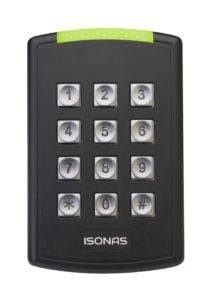
Trevor Ball of Allegion UK asks whether we truly understand the importance of seamless system integration in today’s shifting access control market. In today’s fast-paced digital age, we’re constantly subject to change – and it’s no different for access control.
The world of access control is changing. Ask anyone active in the industry and the likelihood is that they’ll confirm a shift in landscape. Take a step back and you realise how quickly access control has advanced, moving from traditional lock and key methods to the tech-driven security solutions we find in our facilities today.
Generally, as we continue to seek convenience through technological development, we’re seeing a rapidly advancing trend in the implementation of wireless connectivity. Whether this be the devices you find around the home (think wireless headphones or smart home devices) to the advancing market of wireless access control solutions. Today, the idea is to connect devices together, wherever and whenever possible.
The development of wireless access control, in particular, has provided facilities with an abundance of options, including what we now know as “cloud-based” access control. “Pure IP” cloud systems, for example, take access control online, creating a new streamlined security infrastructure – and this is a market that’s set to continue growing exponentially. But this upgrade doesn’t come without challenges.
Change is good?
This adoption of new technologies is mostly viewed in a positive light, seen as an opportunity for improved security and an industry moving forward. However, for some, with change comes more responsibility and, perhaps far worse, uncertainty.
Present an online access control solution to those with an existing physical security system and questions are raised. Will it improve security? How much will it cost? And is it possible for me to integrate the solution into my existing system? Although cloud-based systems can offer a more modernised, assured security network, not everyone is inclined to see it that way at first glance. To those with an already established system (no matter how effective it is), upgrades can mean hassle with additional installations, internal network systems and costs all needing to be considered.
Yet, misconceptions concerning time, costs and integration are just that – misconceptions. The advancing market has given us access to solutions that can recreate or even convert older systems into something that is compatible with new access control software. Pure IP cloud systems, in particular, can improve the overall management of a building’s security with simplicity.
So, as increased connectivity continues to drive market trends, will it eventually force facilities to make the switch? That debate can only be answered with time. However, we only have to look at the accelerating growth of mobile credential usage to see that these disruptive trends could be moving faster than we think. And for that we must prepare.
Seamless integration really is key here. As more choose to update the systems on their premises, we must ensure that building security isn’t compromised in the process. Whilst there’s still a place for physical hardware, facility managers can no longer deliver the expected level of security with a mismatch of security systems running through their buildings. The incorporation of IoT-led security devices (designed to integrate with existing systems) should be seen as a step forward.
Providing systems have been designed with integration, scalability and flexibility features in mind – building security and operations can be improved. Take a larger premises with numerous buildings, such as a hospital or a university campus, for example. With various building types and numerous access points, a set of facilities such as this can own multiple security systems. Today, integrated networks can help facility managers successfully manage multiple geographically dispersed locations in real-time – something that has not been possible from one system until recently. Adding to that, the data that is collected and monitored via these systems is invaluable for facility managers, allowing them to better aid the flow of movement and even understand weak areas of security.
Although the phrase “integration” has almost become clichéd in our industry, the reality is that it is a concept of great importance and one that can no longer be ignored. In short, pairing existing systems with fully-integratable modern access control can not only streamline processes but also improve existing security networks. And as market demand shifts and manufacturers continue to offer these simplified security systems, it could only be a matter of time until most premises choose to incorporate them. After all, the benefits are clear and the technology is available.











